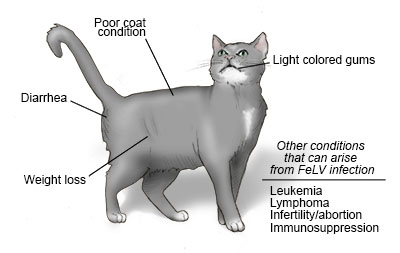Feline leukemia (FeLV) is a retrovirus spread cat-to-cat through body fluids, bites, and parent to kitten. It’s common in young cats. Similar to feline Immunodeficiency Virus (FIV), it causes a slow, generalized decline in your cat’s health. For reference, human AIDS is a retrovirus also.
Feline leukemia does not affect humans and is not related to the leukemias that affect humans. It does not affect dogs. It has been reported in large cats like lions and tigers. As cats get older, they develop a natural resistance to feline leukemia.
Feline leukemia is a misleading term in that fewer than half the cats infected with FeLV actually develop cancer. When they do, it is not the FeLV virus that’s the cause, but the cat’s own cancer-fighting mechanisms have been disabled by the virus.
There is no scientifically proven treatment for the feline leukemia virus. No medication has been found that kills it despite many claims otherwise. If there was a cure everyone would be using it, starting yesterday.
Making your cat indoor-only and creating a stress-free environment are the most notable and significant steps you can do for your FeLV+ cat. Once you’ve done those two things, next on your list should be to focus on the right diet. You need to enable your cat’s immune system to mount the strongest front to combat this condition.
As with many diseases in cats, they experience a decrease in appetite when feeling poorly. That means having a food they like to eat is critical. You could have the most nutritious food in the world but if your kitty won’t eat it, it does no good. So the food must be delicious AND nutritious.
Nutrient-rich meals containing biologically appropriate vitamins and minerals in the correct amounts are essential, especially B vitamins, Omega 3&6, iron for anemia, and nutraceuticals like milk thistle extract which helps remove toxins from the cat’s liver. The best way to do that is with a raw diet, and potentially a custom raw diet, which are moisture rich and also beneficial to the kidneys. Some cats have severely compromised immune systems because of FeLV. They may be a good fit for a gently cooked option that keeps the heat-sensitive nutrients intact but reduces the risk of any bacteria in the system (note: most kibble, dry food, often contains far more bacteria, harmful bacteria, than a top-quality raw food).
Feeding your FeLV-infected cat the best possible diet can greatly affect her overall health and ability to fight off the onset of FeLV-associated diseases. You don’t have to give up feeding raw food because of this diagnosis. Fresh raw food contains all of the nutrients, enzymes, vitamins and amino acids your cat needs in an easily digested form. Good food contributes to a fast recovery and will provide a better quality of life for your sick cat, no matter the disease.
Fetching Foods has several foods that may be a fit for FeLV kitties: Just Cat, Premium Cat, and Custom Cat Meals. Contact us for more information.

In recent years, pet owners have become increasingly concerned about the quality and nutritional value of the food they feed their furry companions. One trend that has been gaining popularity is the use of hydrolyzed ...
Introduction As pet owners, we are constantly seeking ways to improve the health and well-being of our beloved furry companions. One aspect that has gained significant attention in recent years is the use of herbal ...
As we move through this holiday season and towards the new year, we’ve been stuffing our faces as we prepare to stuff our stockings! You might already be at the point where you are loosening ...